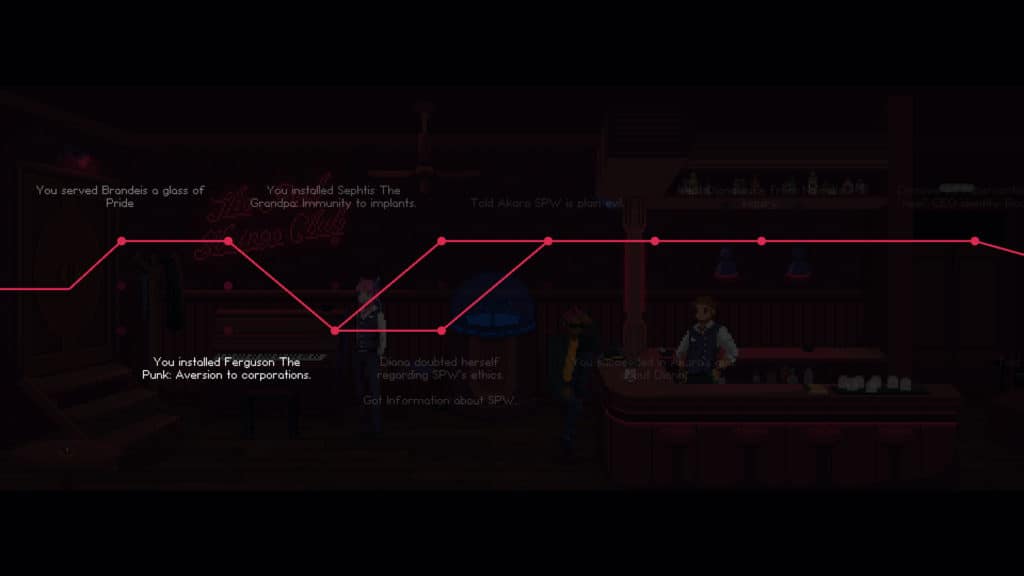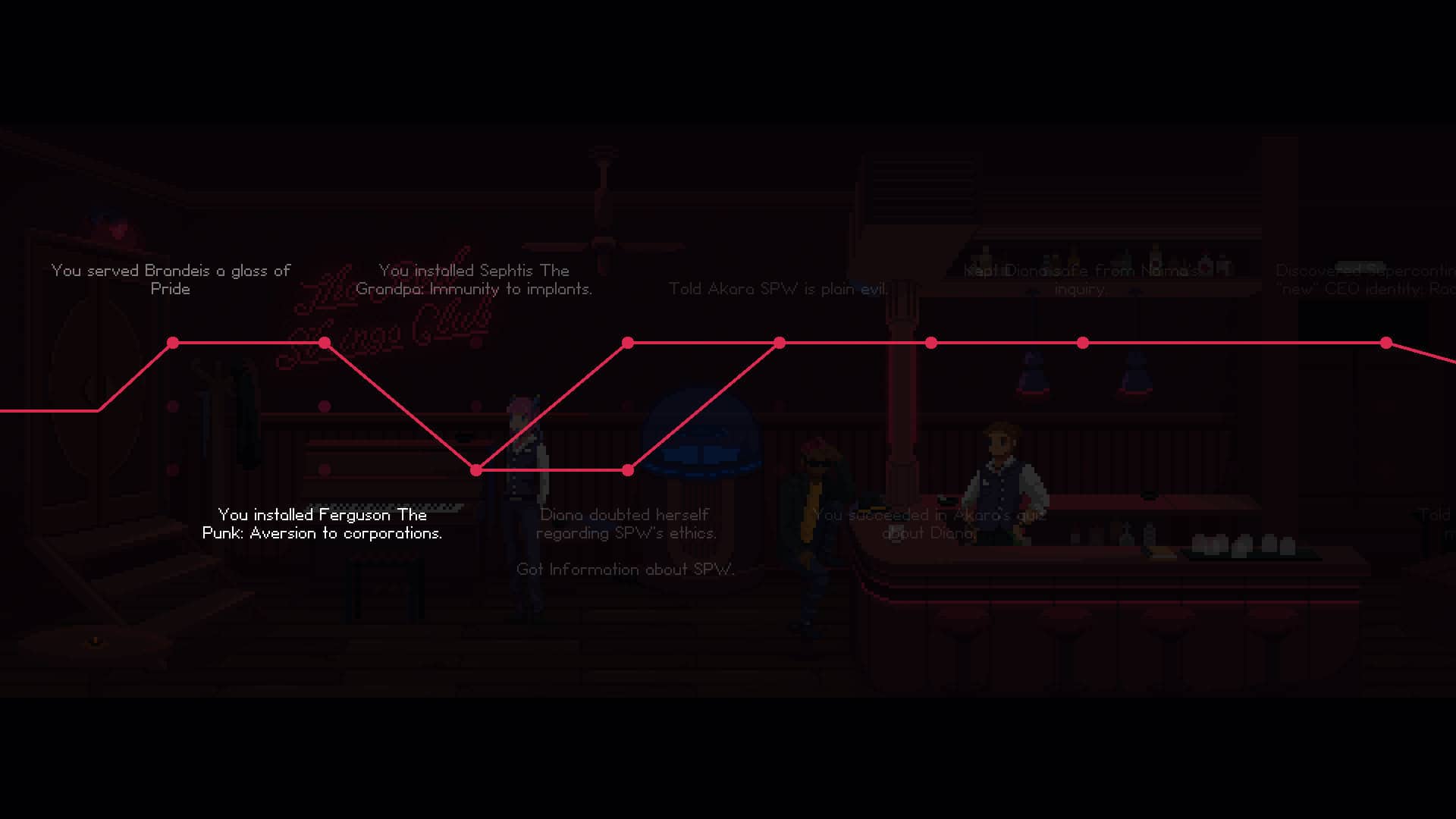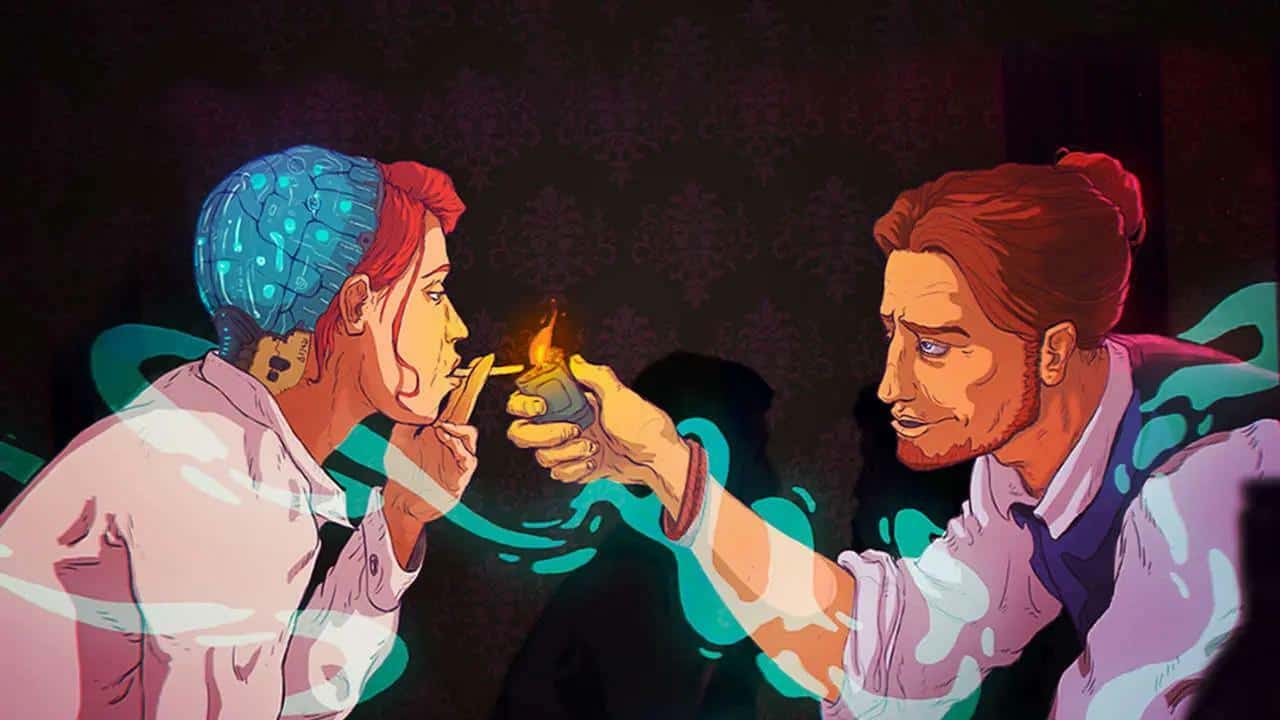You can trust VideoGamer. Our team of gaming experts spend hours testing and reviewing the latest games, to ensure you're reading the most comprehensive guide possible. Rest assured, all imagery and advice is unique and original. Check out how we test and review games here
My anticipation for The Red Strings Club went from being aware it was coming out to salivating over the prospect in the time it took me to play the preview. It’s a short self-contained cyberpunk story (though with a sleight-of-hand sprinkling of details makes it feel like the world it’s set in is fully formed and dense, and the player is only being shown one small part) set mostly but not exclusively in the titular bar.
As Donovan (the bar’s proprietor), Akara (an advanced android) and finally Brandeis (a hacker and/or freedom fighter), you must stop a megacorporation from turning on new software in the chips implanted in the population’s heads, which will remove depression and anxiety and essentially make everyone the best version of themselves, but at the cost (arguably) of their humanity and true free will.
The three protagonists each have a different role to play in uncovering the story: Akara starts off working on a kind of surgical production line, where they hand-craft implants to put into paying customers, making them more popular, confident, or attractive to the opposite sex. Brandeis’ job is to break into the Supercontinent Ltd. offices and impersonate different members of staff on the company’s extensive phone network to finally get access to the software in question. Brandeis’ scene is the one that becomes the most emotionally raw, as his swagger is stripped away almost completely, but it’s also the most frustrating part of the game. As you dial different numbers and try different subterfuges on the same few people, over and over again, it almost becomes trial and error.
/https://oimg.videogamer.com/images/d95f/a260a958-b7db-40fa-8c2f-a4ebe88e4b40_ss_7118f9a2f8f56b2f76a1de19789d73abbdf5f979.1920x1080.jpg)
But you spend most of your time as Donovan, in the middle section of the game.
Donovan is the owner/operator of The Red Strings Club bar, and is in an open relationship with Brandeis. Supercontinent employees drag themselves into The Red Strings Club and you serve them drinks that play on their emotions and lead to them giving different answers depending on their questions. Donovan is a delicious combination of charming and manipulative, mixing layered drinks to pique someone’s fear, joy or arrogance and get the information he needs. He never leaves the club, but as an information broker he sort of doesn’t need to; like many bartenders he can be a charming ear to your problems, but anything and everything you tell him can be used as currency somewhere else. His patrons either don’t know or don’t care. Donovan continues to make drinks, blending six different liquors with ice, each having a different effect on a patrons mood – up, down, left, right, around – that you have to match against the mood you want to bring out. It’s a delicate and engrossing process that can take some time.
The Red Strings Club paints the technologically advanced future in pixel art, but with detail, so you can read characters’ body language and expressions. Donovan’s bottles of booze have arrows incorporated into the design of their labels, and the liquor colours blend one into another into another in a rainbow of your own making. The patrons are varied and well written, each with a different look, feel, and personality to contend with in conversation.
Meanwhile Akara loiters in the corner monitoring their comings and goings, and asks you about them. After each encounter they might quiz Donovan on the person he was talking to, asking if they were telling the truth or how they really felt about different topics. It’s both an interesting part of the game and a way to make the player actually pay attention to the dialogue. Akara will also ask you direct questions about what you would and would not allow if you were in charge of society, and will point out inconsistencies and hypocrisies in your answers: why allow this but not that? What’s the problem with what Supercontinent is doing, really? Can you put it into words? But how is what you’re doing different to Supercontinent?
/https://oimg.videogamer.com/images/26f4/9ea8a6eb-5738-485a-be11-8da967fb6c17_ss_a5508455456f785b24ca744d0e5135a0e9a6423a.1920x1080.jpg)
Because it’s not. Not really. It’s just more bespoke: everything the characters you play as do is manipulation, but it’s manipulation tailored to the individual, lovingly crafted by an expert at your behest, rather than generated by a computer without you knowing. But chances are when someone asks you why you don’t think an advanced android is a person, exactly, or why you’d feel unhappy about a computer chip in your head suppressing your anxiety or depression even though you wouldn’t have to deal with your anxiety and depression, you can’t explain it. But The Red Strings Club asks you those questions and makes you pick an answer. And at the end it asks you to choose what’s most important.
The Red Strings Club is a game that’s melancholy and lovely and will challenge you. It’s a low percenter in that it might not appeal to everyone, but to those it does it’s appeal will be very strong. Like Donovan’s drinks, which, while being lovely to look at, would probably taste very horrible in real life.
In the final section of The Red Strings Club there is a puzzle where the player must unlock a computer belonging to an employee of Supercontinent Ltd. The password for this computer is the deadname of different employee, revealing they are trans. Depending on your path through the game you may uncover more details about this employee, or bypass this aspect of the puzzle almost entirely. You may wish to read more in the two pieces by Waypoint (here and here) as well as the discussion in the Waypoint forums here, and this review from a trans reviewer here.
Developer: Deconstructeam
Publisher: Devolver Digital
Available on: PC
Release Date: January 22 2018
The Red Strings Club
- Platform(s): Linux, macOS, Nintendo Switch, PC
- Genre(s): Adventure, Indie


